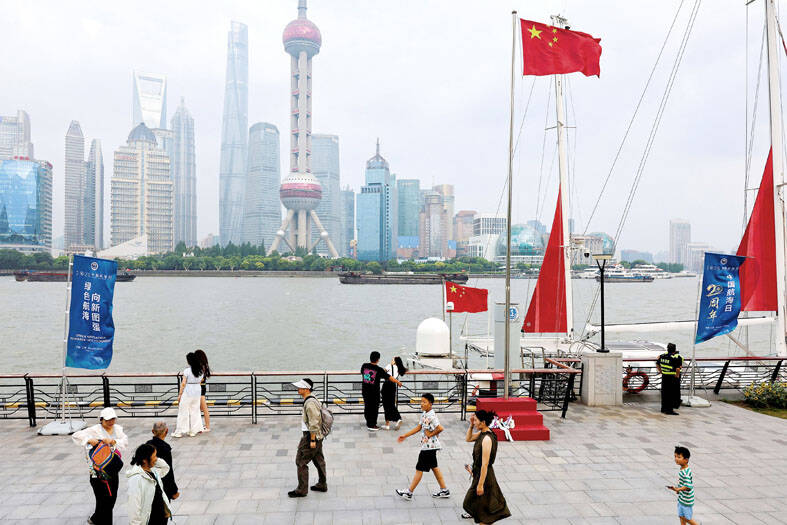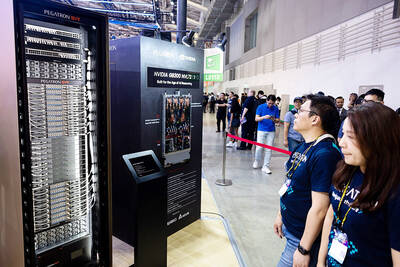A record share of US firms froze investments in China, as trade ties worsened earlier this year, a recent survey suggested.
Fewer than half of the companies surveyed by the US-China Business Council (USCBC) from March to May said they planned to invest in China this year, a drop from 80 percent last year and a record low since the group began asking a similar question in 2006, a report released on Wednesday showed.
While the annual survey was conducted before the easing of tensions following the countries’ talks in London last month, the sharp fall in sentiment underscores the damaging effect of the trade war on investment in the world’s second-largest economy.

Photo: Reuters
Companies are in a “wait-and-see mode,” USCBC business advisory services vice president Kyle Sullivan said in a briefing. “They are riding out the uncertainty in trade policy.”
The survey covered large, US-headquartered multinational companies, with more than 40 percent of respondents representing companies that generated at least US$1 billion in revenue in China last year.
While the country remains an appealing hub for manufacturing and innovation, 75 percent of respondents cited China’s retaliatory tariffs as their top cost concern, as they often rely on inputs from the US.
A record 27 percent of companies said they moved or planned to move some operations out of China, the highest since at least 2016.
Beijing and Washington have seen relations thaw after both sides agreed to approve exports of crucial technologies, with Chinese exports to the US narrowing their drop last month.
Still, shipments to the US fell 24 percent in the second quarter compared with an increase of more than 6 percent for China’s overall exports, official data released on Monday showed.
The survey also gave a sense of how US companies navigated tariffs. While the most common approach was sourcing from alternative markets, about one-third of companies renegotiated prices with suppliers, while a similar share passed higher costs to downstream customers.
The report also found that 32 percent of companies lost market share in China over the past three years, and nearly 70 percent are concerned about losing market share in the next five years.
About 40 percent of companies also reported negative effects from US export control policies, citing lost sales, severed customer relationships and reputation damage in China, it said.
Meanwhile, the proportion of companies reporting impacts from overcapacity rose to 42 percent over the past year, up from 25 percent last year, more than 80 percent of respondents said China’s industrial policies help Chinese companies that were previously uncompetitive and nearly 60 percent of respondents said the policies steer Chinese customers to domestic products, the report said.

AI TALENT: No financial details were released about the deal, in which top Groq executives, including its CEO, would join Nvidia to help advance the technology Nvidia Corp has agreed to a licensing deal with artificial intelligence (AI) start-up Groq, furthering its investments in companies connected to the AI boom and gaining the right to add a new type of technology to its products. The world’s largest publicly traded company has paid for the right to use Groq’s technology and is to integrate its chip design into future products. Some of the start-up’s executives are leaving to join Nvidia to help with that effort, the companies said. Groq would continue as an independent company with a new chief executive, it said on Wednesday in a post on its Web

RESPONSE: The Japanese Ministry of Finance might have to intervene in the currency markets should the yen keep weakening toward the 160 level against the US dollar Japan’s chief currency official yesterday sent a warning on recent foreign exchange moves, after the yen weakened against the US dollar following Friday last week’s Bank of Japan (BOJ) decision. “We’re seeing one-directional, sudden moves especially after last week’s monetary policy meeting, so I’m deeply concerned,” Japanese Vice Finance Minister for International Affairs Atsushi Mimura told reporters. “We’d like to take appropriate responses against excessive moves.” The central bank on Friday raised its benchmark interest rate to the highest in 30 years, but Bank of Japan Governor Kazuo Ueda chose to keep his options open rather than bolster the yen,

Global server shipments are expected to surge to 15 million units next year, from 4 million units this year, with artificial intelligence (AI) servers accounting for about 30 percent, driven by massive capital spending by major cloud service providers, the Market Intelligence and Consulting Institute (MIC) said on Thursday last week. Major cloud service providers — including Google’s parent company Alphabet Inc, Microsoft Corp, Amazon.com Inc and Meta Platforms Inc — are projected to budget US$450 million for capital expenditure next year, up from US$400 million this year, MIC ICT [information and communications technology] Industry Research Center director Edward Lin

Even as the US is embarked on a bitter rivalry with China over the deployment of artificial intelligence (AI), Chinese technology is quietly making inroads into the US market. Despite considerable geopolitical tensions, Chinese open-source AI models are winning over a growing number of programmers and companies in the US. These are different from the closed generative AI models that have become household names — ChatGPT-maker OpenAI or Google’s Gemini — whose inner workings are fiercely protected. In contrast, “open” models offered by many Chinese rivals, from Alibaba (阿里巴巴) to DeepSeek (深度求索), allow programmers to customize parts of the software to suit their